- Home
- Sicilian Culture
- Sicilian People
SICILIAN PEOPLE: A PEEK INTO THE HEART OF THE MULTITUDE
Planning a trip to Sicily? Seen the stunning photos of ancient Greek temples, sparkling blue waters, and Mount Etna smoking majestically in the distance? However, to truly understand this incredible island, you must first comprehend its most valuable treasure: the Sicilian people.
Sicily is not just another region of Italy. It is a world unto itself, a place with a soul so distinct and a history so complex that it is no wonder it has forged a people unlike any other. Get to know them, and you will transform your vacation.
Giuseppe Tomasi di Lampedusa, the world-renowned author of The Leopard (1958), had already drawn a parallel between the dramatic geography of his home island and the character of its inhabitants. Sicily is an island of striking contrasts. You'll find sun-scorched plains, lush volcanic slopes, and rugged mountains all within a short drive.
One could guess that this constant negotiation with a powerful and sometimes harsh landscape is the source of the famous resilience in its inhabitants. As must be the very colorful, yet rough, history of this stepping stone between the worlds.
And much more, for which we'll soon get back to. Still, it is good to remember that every individual is different. It is easy to form stereotypes about any one nation. So, whatever I happen to say, these observations only reflect general tendencies - at best - and are not to be taken as universal truths.
I don't want to pack people into ready-made molds, and I encourage everyone to look beyond general characteristics and toward the unknown individual. Still, some prior knowledge about the nature of a people can also facilitate such encounters. So, let's move on...
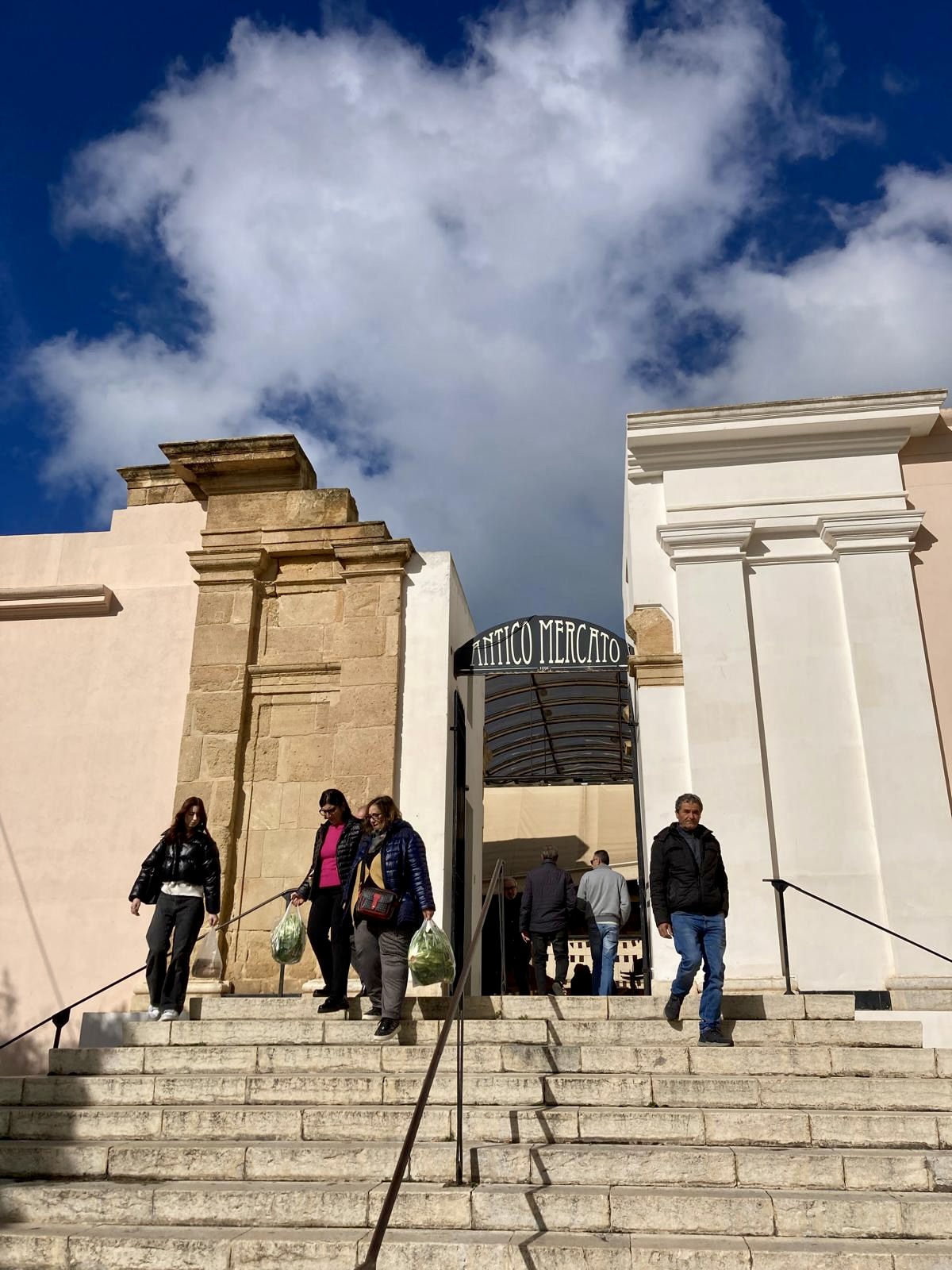 People coming out from the fish market in Marsala.
People coming out from the fish market in Marsala.Historical Foundations of Sicilian People
Imagine a place that has been a strategic prize for millennia. Which every nation in the surrounding area—and there are many, since we are in the cradle of the so-called Western civilization—has trodden upon. This is why everything in Sicily, from the food to its people, is a mixture of all that has happened in the Mediterranean region over the last few thousand years.
In other words, the influences of Sicilian people are manifold. It is also not possible to examine them all here. The final concoction is more of a mystery than something that can be broken down, analyzed, and then put back together again.
Over the centuries, Sicily has been ruled by the Greeks, Romans, Vandals, Byzantines, Arabs, Normans, French, Spanish, and finally, the Italians. This manifold history didn't just shape Sicily's architecture and cuisine—it has also necessarily affected how Sicilians view the world.
However, people have not only come to Sicily from all over, but Sicilians have also always left for other places. The most recent grand migration was to America in the early 20th century.
So, the self-confidence of Sicilians is not merely inward-looking, but is also used to conquer new territories. The Sicilian people have not only been overrun, but they have also sent their members to different corners of the world. And done it quite successfully.
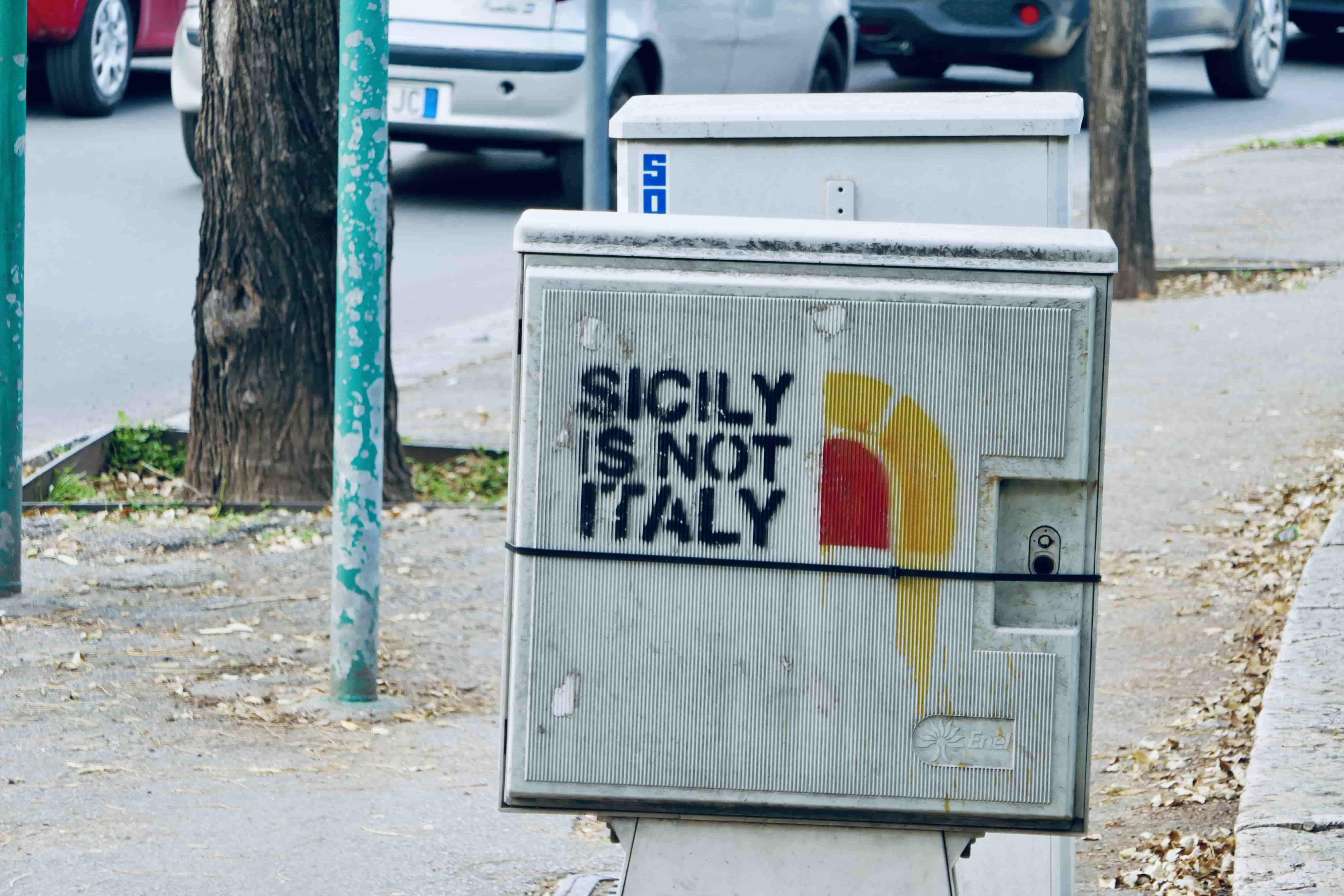 Sicily is not Italy. A message from the streets of Palermo.
Sicily is not Italy. A message from the streets of Palermo.Sicily Vs. Italy - What's the Difference
As mentioned earlier, the Italian state can also be viewed as part of the continuum of different rulers of Sicily. When viewed in this light, the Italian state is little more than yet another nuisance.
This has led to a strong independence movement in Sicily, whose motives have not always been entirely altruistic. For example, many members of organized crime have believed that it would be better if the state did not interfere in their affairs.
In any case, the independence movement has achieved results. Thanks to it, Sicily became an autonomous region of Italy in 1946.
So, while technically Italians, many Sicilians consider themselves Sicilian first and Italian only second, if at all. Although Italian culture permeates Sicilian homes through television and other media, many Sicilians' identities remain tied to the island, its dialect, traditions, and other aspects.
This profound sense of being Sicilian, referred to as "Sicilianità," can be described as a blend of pride, fatalism, passion, and a certain world-weariness. Life may not always be easy, but the most important things can be found nearby, in a shared meal, a local festival, or the laughter of children.
This brings us to some core values of Sicilians, such as the significance of family.
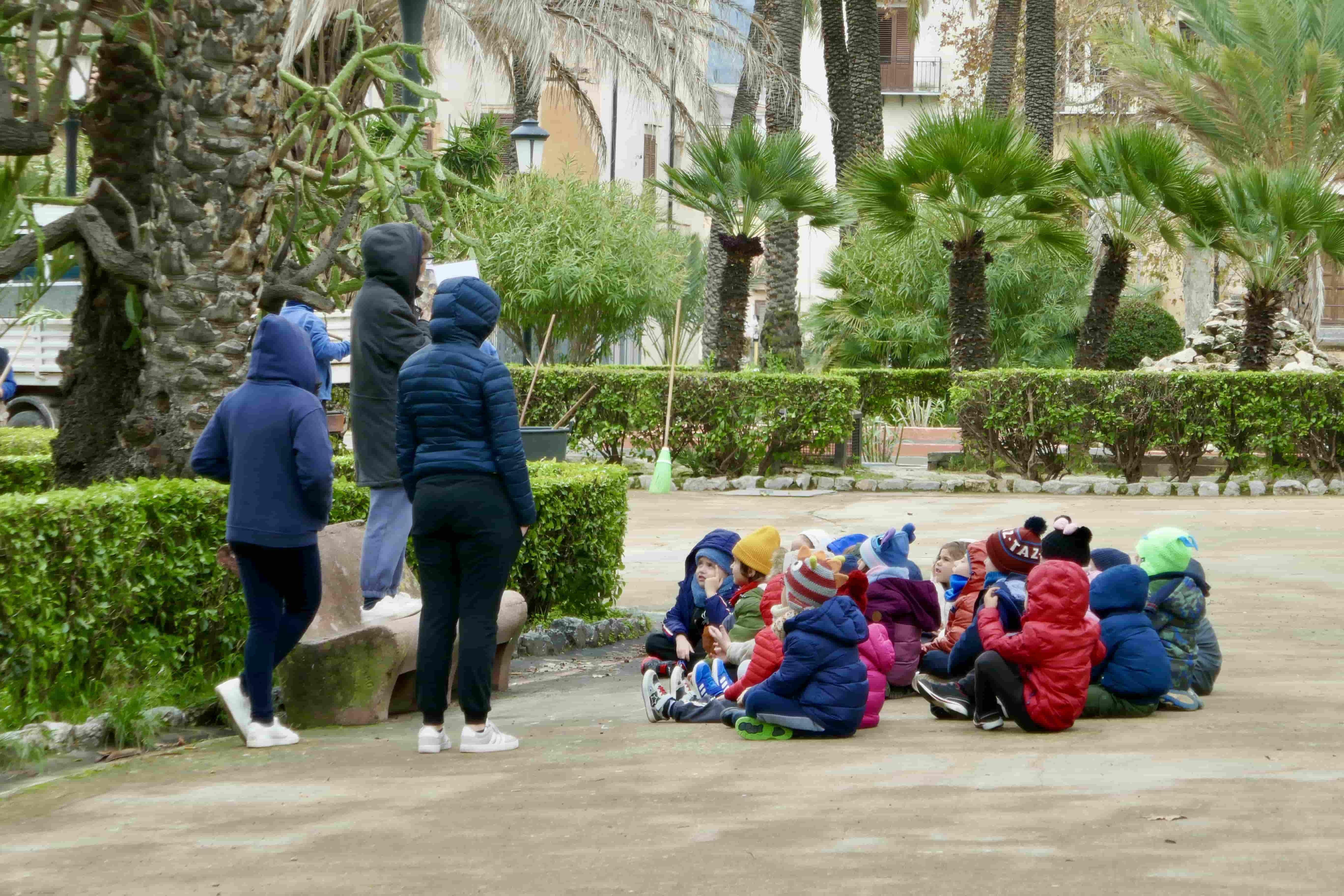 Children listen to historical fairy tales in a park in Palermo.
Children listen to historical fairy tales in a park in Palermo.The Significance of Family in Sicilian Culture
This aspect of the Sicilian national character might be best examined from a historical perspective. So think about all those conquerors. And especially the latest, before the Italian state. That's when the Spanish ruled Sicily - at times with an iron fist - and from afar.
The actual rulers rarely bothered to visit the island. In their place were the feudal lords who were allowed a free hand to do whatever their interests demanded, as long as they provided citizens for the king's army when ordered.
So, for centuries, the government was a foreign entity, something to be endured, but in no way trusted. If this hasn't fostered a deep-seated skepticism of authority, I don't know what would have. On the other hand, it fostered a reliance on more immediate and trustworthy networks. Meaning, the family.
Some say that the family is losing its significance. Children are no longer raised in the same way as they were in the past. Family ties are weakening, parents are irresponsible, and people in general are not like they used to be. And that may well be the case. Winds of global trends are also shaking Sicilians.
Nevertheless, the importance of family remains stronger in Sicily than in many other Western countries. "La famiglia" can still be seen as the bedrock of society, a source of support, and the source of identity.
The concept of family can also be considered in a broader sense. A notable example of this can be found amongst the Mafia. However, it does have its roots in everyday reality.
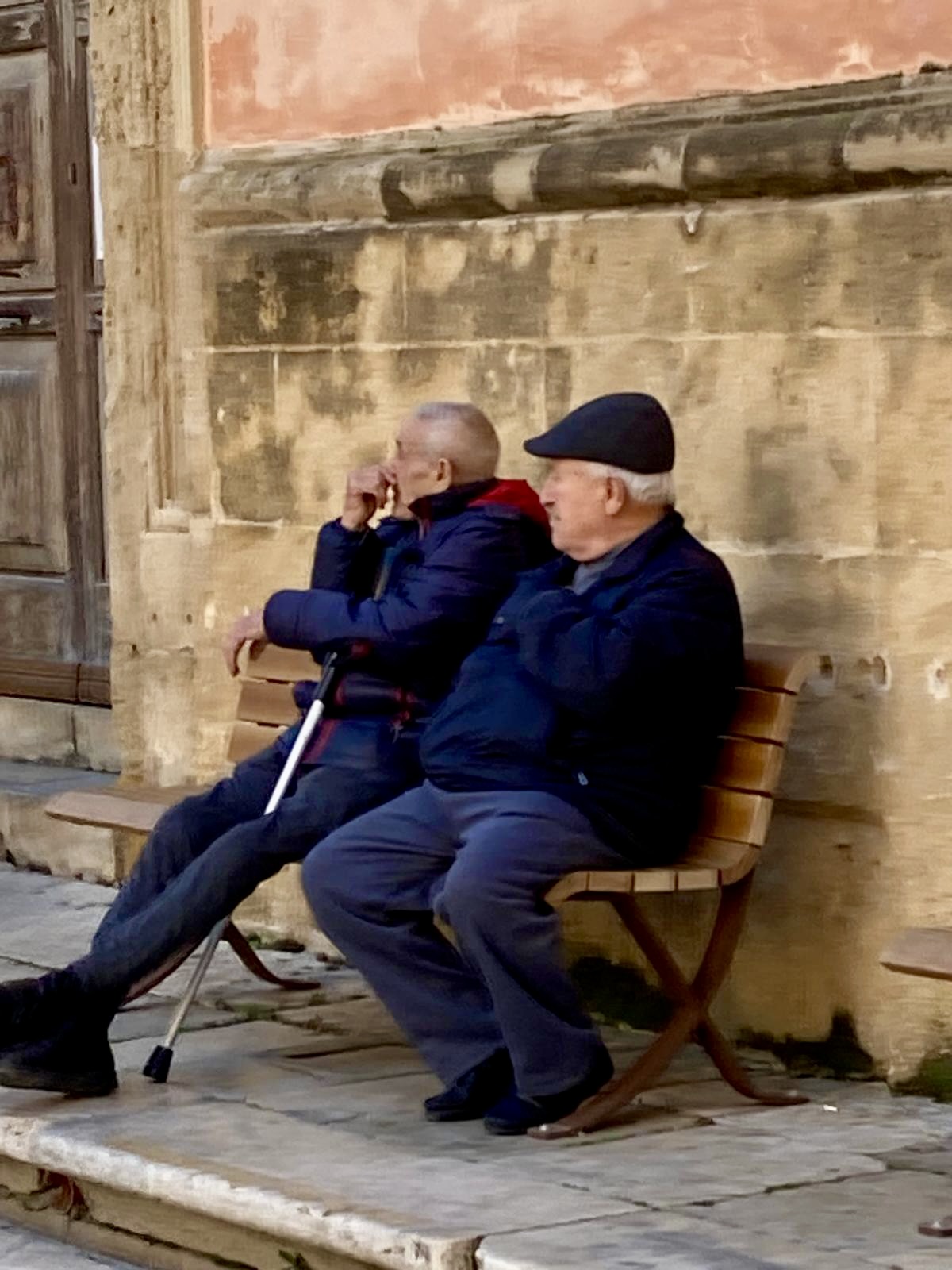 Two old friends spending time together.
Two old friends spending time together.A Sicilian travel guide once described the island as living in a "mafia culture". By this, he did not mean the actual Mafia, but rather the way people seek help from their network of "connections" rather than from society.
Politicians and other public servants are good only to the extent that they are extensions of these personal networks. The name of the party is less important than whether the representative is willing to lend a helping hand in relation to the voter's everyday problems.
Perhaps paradoxically, this focus on personal relationships also fosters a more profound sense of community. If you depend on others near you, then the decisions should also be made with the well-being of the community as a whole in mind.
It serves well to keep in mind that when you are welcomed by a Sicilian, you are being judged not just on your potential relationship with them, but also with their entire unit.
The Meaning of Bella Figura
One of the key cultural concepts to understand - in Sicily, as well as whole of Italy - is "fare la bella figura," which literally means "to make a beautiful figure."
It's about presentation, pride, and making a good public impression. Its influence is seen in everything from how people dress to go to the market to the importance of showing respect and having good manners.
This isn't about vanity. It's about showing respect for yourself, your family, and the people you are interacting with. By presenting your best self, you are honoring the social fabric.
As a visitor, dressing respectfully, especially when visiting churches or someone's home, will be noticed and appreciated.
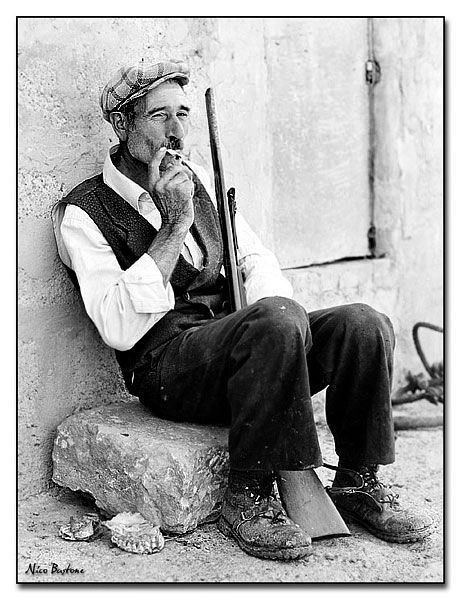 Sicilian countryman in the 1950s.
Sicilian countryman in the 1950s.Sicilian Character
Now, let's delve into a more complex aspect of the "Sicilian character." Two characteristics stand out. Sicilians approach social situations with admirable lightheartedness and flexibility. They are socially skilled, which is no surprise when you consider how much importance people have always placed on personal relations in these parts of the world.
On the other hand, flexible social interaction is underpinned by a strong sense of identity, which at times borders on gloominess. A certain pessimism, fatalism, and ironic cynicism seem to be part of the character of many a Sicilian people.
It could be a protective mechanism born from a history where promises were often broken and hopes were dashed by forces beyond people's control. Or, like Lampedusa said, it might be born out of the harshness of nature.
In some places, the wheels of time grind creatures more thoroughly than in others.
And then again, just around the corner, life can be paradisiacal, fertile, abundant, and as beautiful as can be. Sicilian people are certainly capable of finding joy in these small yet precious moments of life.
This duality is at the heart of the Sicilian character: a blend of suspicion and warmth, of world-weariness and a vibrant appreciation for life.
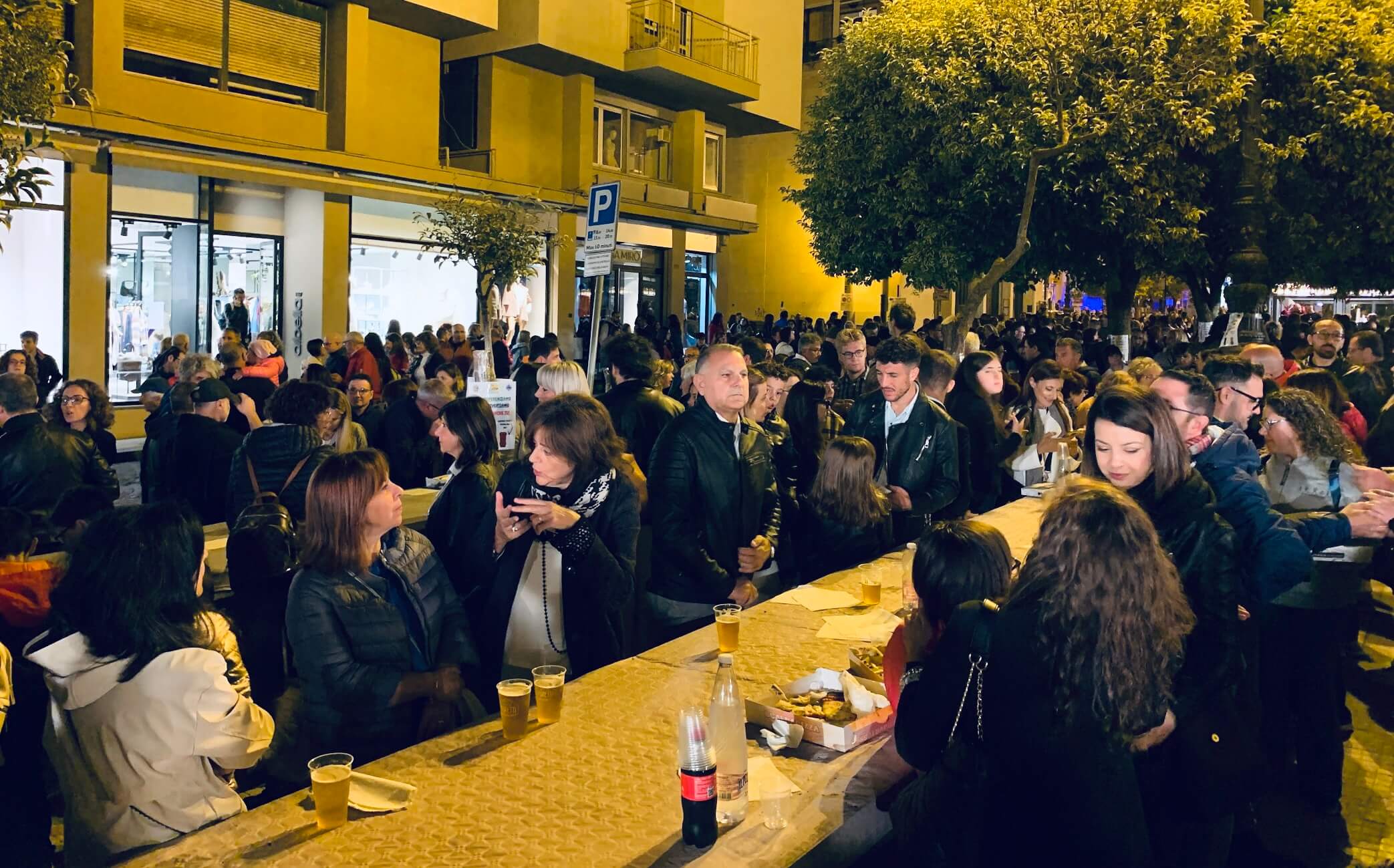 If life isn't always a bed of roses, there are plenty of different celebrations throughout the year to balance things out. Like the pizza festival in Enna, pictured here.
If life isn't always a bed of roses, there are plenty of different celebrations throughout the year to balance things out. Like the pizza festival in Enna, pictured here.Communication in Sicily
The Sicilians' way of communicating can seem intense to the outsider. Indeed, conversation around here is not meant to be a quiet, orderly exchange of information. Better to think of it as a full-body performance, complete with dramatic hand gestures, fluctuating volume, and intense eye contact.
Sometimes it is easy to mistake this as rudeness, if not outright anger. But be assured, it is simply the Sicilians' way of expressing themselves.
At the morning market, you'll witness animated discussions between vendors and customers over the ripeness of tomatoes, complete with theatrical gestures and mock indignation that dissolves into laughter.
You'll see fingers pinched together, hands waving dismissively, and shoulders shrugging with operatic flair. Each movement has a specific meaning, a rich vocabulary that adds layers to the spoken word.
You might also be surprised by how directly Sicilians express their opinions, to the point that it might seem blunt to outsiders. Sicilians often say what they think, forgoing some of the pleasantries you might be used to. This isn't rudeness; it's a form of honesty. In this way, you at least know where you stand with someone.
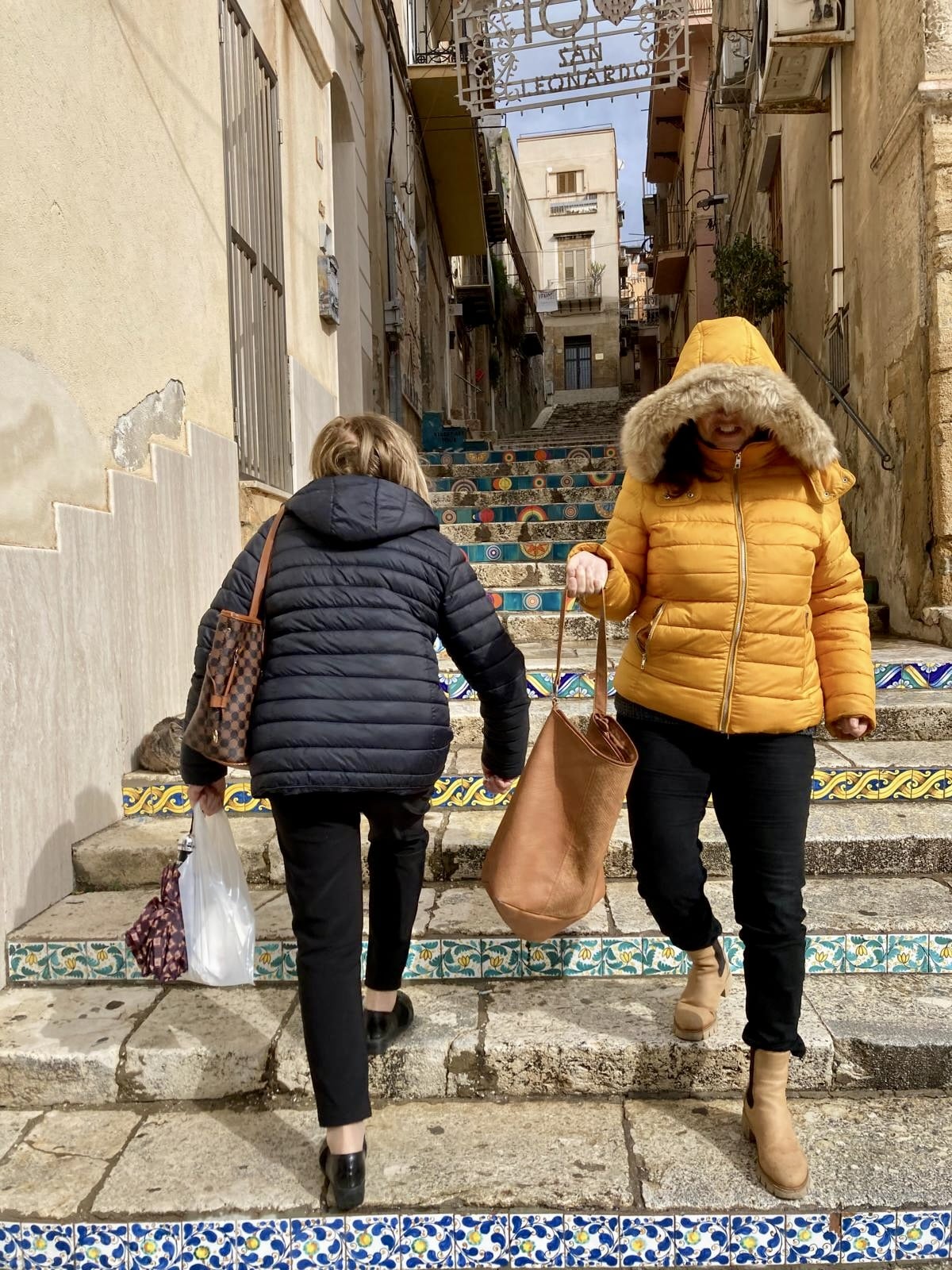 Two ladies pass each other on the street in Sciacca.
Two ladies pass each other on the street in Sciacca.But What About the Mafia?
And then there is... *sigh*... the Mafia. For many, the word "Sicily" is inextricably linked with La Cosa Nostra. And sure, it is a painful part of their history. Still, it is crucial to understand that it does not define the daily life of the average Sicilian.
For you, as a traveler, the Mafia is a non-issue. It is a shadow world that you will not encounter. To the vast majority of Sicilian people, it is a multi-headed monster they have been dealing with, in one way or another, for generations. Bringing it up in casual conversation is considered impolite and tiresome.
If the Mafia is what you want to talk about, it's better to focus on the anti-mafia movement and the courage of the everyday citizens, judges, and journalists who have risked their lives to build a better, safer Sicily. That is the real story of modern strength.
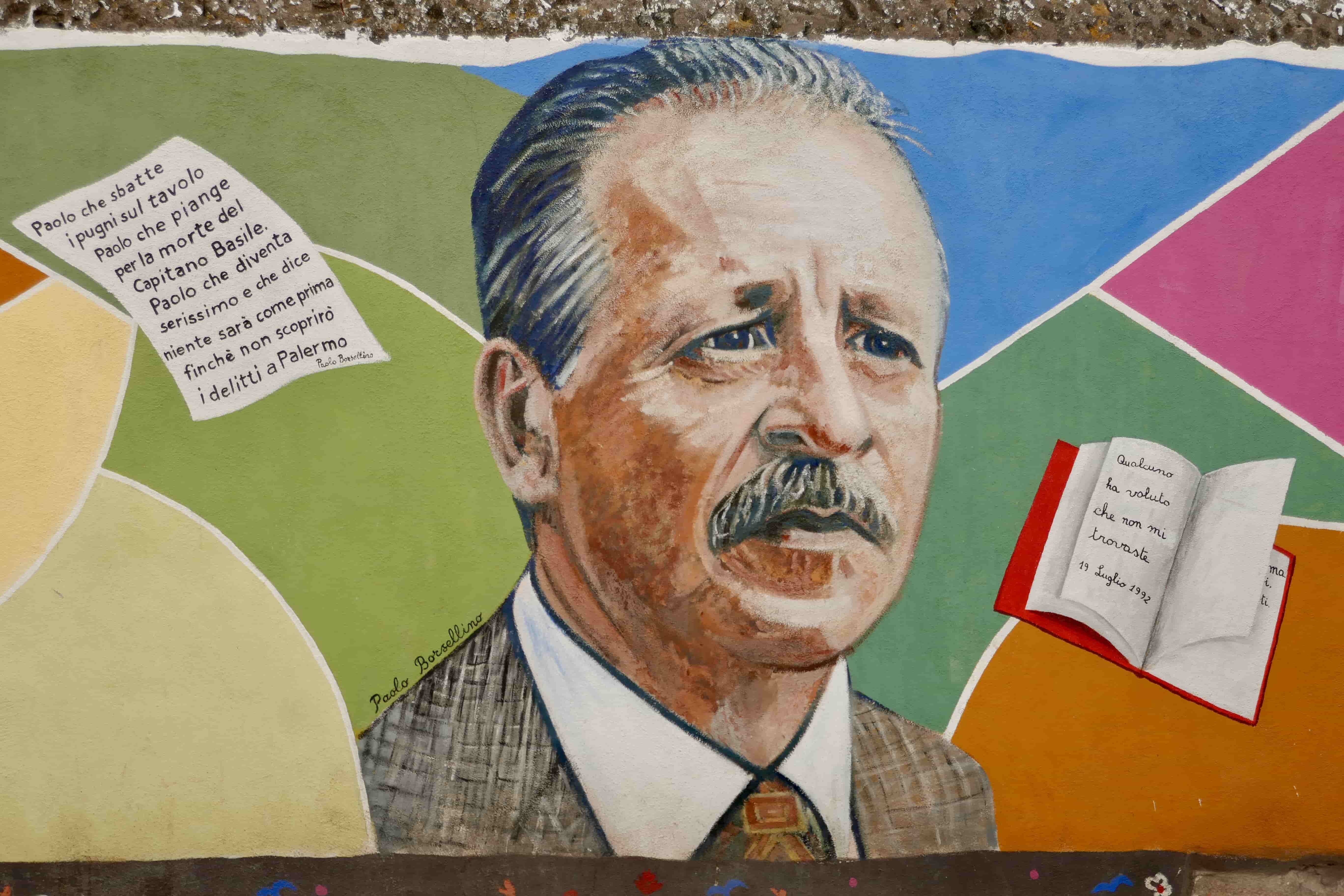 The Wall of Legality in Palermo celebrates the many anti-mafia activists throughout the history. Like the anti-mafia prosecutor Paolo Borsellino.
The Wall of Legality in Palermo celebrates the many anti-mafia activists throughout the history. Like the anti-mafia prosecutor Paolo Borsellino.Conclusion: Embracing the Rich Cultural Heritage of Sicilian People
So, as you prepare for your journey, remember that you are visiting a place with a soul forged in fire, conquest, and incredible beauty. The Sicilian people are not a simple monolith; they are a complex, passionate, and deeply proud people who carry thousands of years of history with them, want it or not.
And then again, Sicilians are people like everyone else, and, as with people in general, it often matters less who the other person is than how you relate to them. Go with an open mind and a respectful heart, and you can't go much wrong.
Patience, a smile, and a few Italian words help. And remember to accept the hospitality that is offered. If you do, you will discover that the true beauty of Sicily lies not just in its ancient stones and stunning coastlines, but in the unforgettable warmth of its people.
(Last edited: September 10, 2025.)
Recent Articles
-
Festivals in Sicily: Dates, Rites & Travel Planning
Feb 11, 26 09:22 AM
Festivals in Sicily help you time your visit for processions, performances, and street food—season by season. -
Taormina: Is It Worth It on Your Sicily Itinerary?
Feb 07, 26 11:11 AM
Wondering if Taormina belongs on your Sicily trip? Explore beaches, shopping, and sights—then choose well. -
Car Rental in Sicily: A Traveler’s Guide
Feb 04, 26 01:09 PM
Planning car rental in Sicily? Learn costs by season, insurance basics, required documents, and more.
Follow MANY FACES OF SICILY on Facebook, Instagram, Bluesky & Tumblr
Contact: vesa@manyfacesofsicily.com







